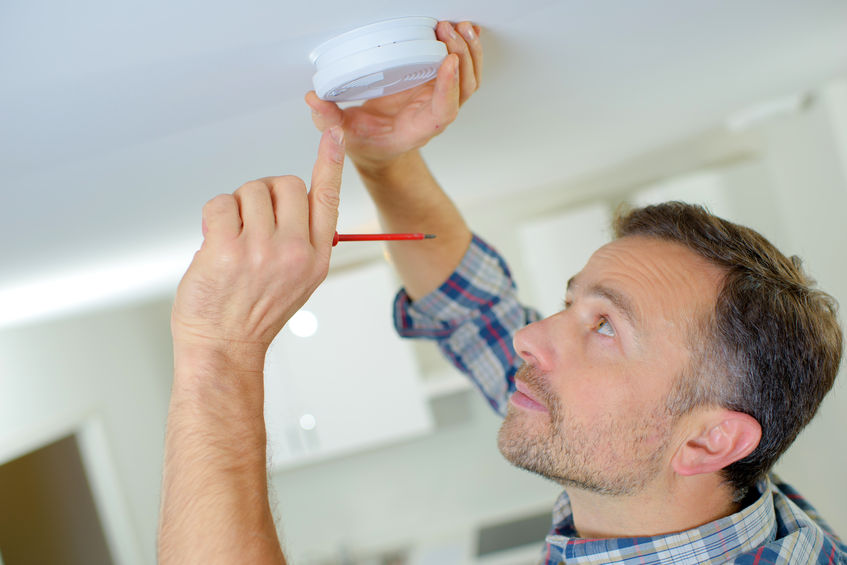Did you know that, according to the Home Safety Council (HSC), injuries at home account for almost 20,000 deaths and more than 20 million medical visits each year? (Source: safekids.org) And with spring-cleaning just getting started in many homes, we at Horizon Family Medical Group want to remind you of things you can do to stay safe at home.
Preventing accidental poisoning
Poisoning is one of the top causes of accidental death at home. We’ve all heard about the dangers of carbon monoxide poisoning and buying detectors, but did you know that accidental ingestion of poisonous household substances happens more often? Accidental overdose on prescription medications is also, unfortunately, a common cause. In fact, in 2013, more than 59,000 kids went to the ER with poisoning from accidental ingestions, as opposed to about 3,551 cases of carbon monoxide poisoning. (Sources: safekids.org)
Avoiding accidental ingestions
Keep dangerous substances out of reach of small children. You may also want to invest in cabinet locks. Bug spray or rodent repellents should never be kept at ground level. Bleach and laundry soap should also be kept secured. Be especially mindful of the new laundry and dishwasher dissolvable pocket-sized packs or tablets. Kids are attracted to the bright colors and strange textures of the tablets, often putting them in their mouths unaware of the danger. (Sources: The American Academy of Pediatrics [AAP.org, HealthyChildren.org])
Mixing medications or taking with alcohol
Be very careful about mixing medications, taking too much medication (e.g., painkillers), and mixing medication with alcohol. If you have questions about what you should and shouldn’t take, talk to your doctor here at Horizon Family Medical Group and he or she will help.
Preventing falls
Falls are another of the top causes of accidental death and injury at home. According to the National Safety Council (nsc.org), more than 29,000 people died from falls in 2013.
You may think falls only occur from ladders outside, but ladders aren’t the only danger. Many of the items in your home can lead to falls as well. Step-stools, stairs, chairs, uneven or loose flooring and door jambs, and even small rugs are potential issues.
- Ladders: Ensure you don’t climb higher than your ladder indicates (e.g., don’t stand on the top step of the ladder). Take care not to lean too far to one side or the other. You may also want someone to help you by holding the ladder.
- Step stools: Center your foot or feet on the stool when using a step stool to avoid uneven weight distribution (your step stool may flip). Avoid reaching too far to one side or the other.
- Uneven or loose flooring and door jambs: Repair uneven or loose flooring and door jambs to prevent trip and slip hazards.
- Rugs and floor coverings: Keep small rugs and other floor coverings from slipping. A variety of non-slip products are available online and from your local hardware store.
Preventing burns and smoke inhalation
Ensure your home has effective smoke detectors. Each year, people die or experience lung damage and burns because they either didn’t have smoke detectors, or they weren’t working properly. About 2,200 people died in 2013 from burns and injuries related to fire. (Source: nsc.org) Test your detectors at least twice a year. Pick a time you can always remember, like during the week of Christmas or Hanukkah, then again around the 4th of July. You may also want to invest in a combined smoke and carbon monoxide detector, or if you already have smoke detectors, buy a separate carbon monoxide detector.
Preventing drowning
Kids are at a higher risk of drowning. It’s the number one cause of death in kids aged 1 to 2, and second leading cause of death in kids aged 3 to 6. (Source: nsc.org) We all know about teaching your kids to be safe around swimming pools. Fencing and pool covers should be mandatory. But pools aren’t the only causes of drowning at home. Kids can drown in even an inch of water. That small, decorative pond you built in the backyard…or any standing water or water feature, can be dangerous. Kids fall into 5-gallon buckets, toilets, or bathtubs every year. Sometimes mom or dad runs to answer the front door, or their cell phone, leaving kids unattended in the tub for just a few minutes. Sadly, sometimes that’s all it takes.
Adults and elderly people are also at risk of drowning at home. The National Safety Council suggests adults should swim with a buddy, and never swim if you’ve been drinking alcohol or taking certain prescription medications. Take care in the bathtub. Consider installing grab bars and a textured flooring in your tub. (Source: nsc.org)
Putting the number for Poison Control in your phone
Your healthcare providers here at Horizon Family Medical Group want to ensure you’re safe at home. Make sure you have the number for Poison Control (1-800-222-1222) programmed into your cell phone. If an emergency occurs, you don’t want to waste valuable time searching for the right number. And as always, call 911 if you have an acute injury at home.
If you do experience any bumps, bonks, bruises, or non-life threatening injuries, STOP a moment and decide where the best place of care is. Emergency Rooms are wonderful resources when we are in jeopardy, but for bumps and bruises, ERs often have long waits and high deductibles. Save yourself some time and money and make use of other points of care options when you can!

